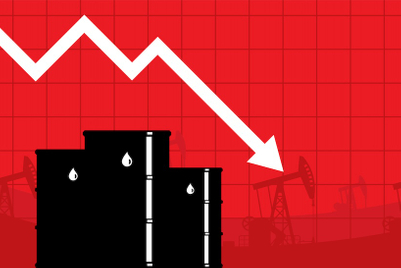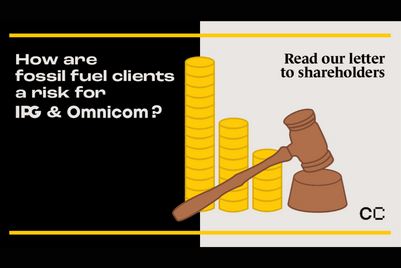
Over 70% of employees say their sense of purpose is defined by their work, according to research by McKinsey. That’s a staggering percentage.
In a podcast episode to discuss the research findings, Naina Dhingra, a partner at McKinsey, said: “Millennials, even more so, are likely to see their work as their life calling. So what that means is that people are looking for opportunities in the work they do day-to-day to be actually contributing to what they believe their purpose is.”
Let’s pan to the fossil-fuel industry. Our story on January 25 showed that marcomms agencies continue to work with fossil-fuel companies despite clear evidence that these companies represent three quarters of carbon pollution. This brings the question: What does this mean for agency talent—especially those that are increasingly associating their personal purpose with the work they do?
A talent crisis is underway
According to a survey by Comms Declare in Australia, global warming was found to be one of the main concerns for young people in the creative industries. Despite these concerns, many have been forced to work for coal, oil, or gas company accounts.
From a total of 103 responses of under-30 communications professionals in Australia, Comms Declare found that 73% are hesitant to work with fossil-fuel clients, while 67% think their agencies should take a stronger stand against fossil-fuel clients. So far, only 39% of agencies said they would refuse fossil-fuel work.


And while oil and gas companies remain the most ‘problematic’ for young professionals, other issues also cause concern, including promoting timber milling of native forests and the clearing of forest trees for economic activities.
Duncan Meisel, co-founder of Clean Creatives, says that large networks that continue to work with fossil-fuel clients will not last forever due to a lack of talent.
“Young people in particular are more concerned about climate change than other generations,” he says. “Many of those who participated in the climate strike are starting to graduate and are entering the workforce. And so as questions become more front and centre, about the scale and scope of the climate emergency, I think it will be harder for the big networks to avoid it.”
At the moment, Meisel says that larger networks find it difficult to ‘sell’ the idea of working on fossil-fuel accounts to full-time staff, and are more inclined to subcontract the work out to freelancers.
Belinda Noble, founder of Comms Declare, says that agencies that are associated with the fossil-fuel industry will inevitably bleed talent. In fact, member agencies who have signed onto the Comms Declare pledge against fossil fuels have told Noble that they have been “inundated with talent” who want to work with them.
Meanwhile, what's the situation like in-house?
John Lee*, a Singapore-based marketer at one of the top five international oil companies told Campaign Asia-Pacific on the condition of anonymity that what keeps him awake at night is the shrinking pipeline of new talent wanting to join the industry. Lee, who’s been part of the industry for 15 years, says that the "ongoing green narrative" portrays the oil industry in a somewhat simplistic and unflattering way.
“It could not be further from the truth,” says Lee. “Remember that crude oil is the cornerstone of everyday life and all modern-day necessities and marvels are derived from fossil fuels. I would implore the younger generation to probe deeper into the world of oil and gas and chemicals to understand what the industry has to offer.”
He added that those working in the fossil-fuel industry understand that public perception has been somewhat unfavourable. However, in peer conversations, employees remain unfazed.
“Ironically, this profound challenge to reach ‘net-zero’ has united everyone in the [fossil-fuel] industry to double down and realise the ESG commitments made to reach ‘net-zero’ in the coming decades with new technological and digital breakthroughs,” says Lee.
He argues that the negative perception towards fossil fuels is largely due to a slow transition towards sustainable fuels.
“The biggest challenge (in my opinion) is managing this transition in an orderly manner which involves new capital investments, research and development, and market expertise. The public opinion is that this should be completed overnight, but the reality is far more complex, and this will be a decades-long journey,” Lee adds.
How should agencies manage employee values?
Findings from a recent edition of Edelman’s Trust Barometer found that one in five employees had left their job or planned to leave their job with a majority citing “finding a job that better fits with my values” as a primary motivator for doing so.
While values can differ greatly from individual to individual, agencies are finding it tricky to straddle this balance of making morally sound decisions and sustaining its profits. But based on stats presented in this story, it’s clear that profit being used as a reason to continue working with ‘problematic’ clients is not enough to retain and attract talent.
This is more so the case when employees are forced or pressured to work with fossil-fuel clients despite hesitancy in doing so. Based on the Comms Declare survey, 40% of young communicators say they feel pressured to work for a client of the agency who contributes to increasing greenhouse gas emissions.
When Campaign Asia-Pacific asked its readers through a spot survey to tell us how they feel about this issue, many respondents said they would appreciate the choice to work (or not work) with clients in an agency. However, not all were comfortable expressing their displeasure to managers should they be asked to work with clients whose values they don't align with. Two respondents said they would rather “keep their concerns to themselves”. Most respondents agreed that agencies should provide employees a moral choice about working on particular accounts.
“One of the things I appreciate most about my current agency is that I can choose not to work on an account that isn't in line with my principles/beliefs. There have also been instances where the agency has chosen not to pursue a business because the team felt it conflicted with their principles. This is something I very much appreciate as the agency respects our thoughts and beliefs.”
—Anonymous respondent on Campaign's spot survey
"If it's focused on their efforts to promote more green-fuels and transitioning to carbon neutral, I would be fine with it. It's no different than working on any other account that isn't focused on sustainability (fast fashion, luxury, FMCG—all of them are polluters)."
—Anonymous respondent on Campaign's spot survey
"If the bigger agencies give up fossil fuel representation—which they will try to defer as long as possible—there will be plenty of smaller agencies willing to pick up the accounts."
—Anonymous respondent on Campaign's spot survey
"I would not work for any company that contributes to the climate emergency. I would leave any agency that made me work on a coal, oil or gas account."
—Anonymous respondent on Campaign's spot survey
Tripti Lochan, co-CEO of VMLY&R Asia, says that her agency offers employees a choice, as some have expressed moral concerns about working on particular accounts.
“Some people do have an issue. And when they do, they feel comfortable to talk about it," she says. "We are not going to force anyone to work on industries that they are not morally comfortable with. And we had such a case with one of our very senior leaders, he came up to me and said ‘I don't work on alcohol and tobacco’. That’s a choice he made and that's fine. People have personal choices, and we have to respect that.”
Kelly Johnston, COO of Sandpiper Communications, says that no consultant should be forced to work on any client that they fundamentally disagree with.
“It's very important that agencies create an environment that encourages consultants to speak up and have a voice without any fear of being criticised or it being career-limiting,” she says. “If you're a company that's not listening to your people, you can reasonably expect there to be backlash. At the minimum, that person leaves and you lose great talent.”
Aside from offering employees individual choices, agencies should firstly determine its value-set and boundaries at a company-level. Sandpiper, for instance, has crafted a list of questions for prospective clients to respond to when approached with a sustainability- or ESG-related brief. This helps Sandpiper weed out the bad from the good at the start, and not get “caught out” at a later stage of a client partnership.
“I'm sure there are situations where an agency thought they were supporting something really good. But then the technical experts came in and pulled it apart and found out that everything they told us is a lie,” says Johnston.
She stresses that questions should revolve about the credibility of a sustainability initiative to avoid the agency being blindsided into promoting a greenwashed campaign or cause.
“Are we just being called in to create a bunch of webinars or thought leadership pieces on our clients’ ESG? Or are they really good for the community? This is such a big part of reputation now, and every agency should be thinking it,” says Johnston.
Some agencies might also act on fear of backlash—whether from the public or from employees. For example, in 2019, Edelman pitched and won a contract to fix the public image of a private prisons company with contracts from the Trump administration to run immigrant detention centres. The company eventually dropped the account following employee backlash and a fear of the news being leaked.

This lack of transparency and clarity extend to agencies working with fossil-fuel agencies, and goes hand-in-hand with Comms Declare’s findings that show a lack of publicly available sources for agencies’ partnerships with fossil-fuel clients. It indicates that agencies’ fear of being ‘outed’ supersedes the need to exist for the greater good. Che Proximity, M&C Saatchi, Mediacom, Wavemaker, McCann and PHD are among agencies that fared poorly in the report’s transparency rating when asked to disclose fossil-fuel clients.
“Our surveys have shown that agency heads are out of step with the climate concerns of their younger workers and that those aged under 30 are being asked to work for highly polluting companies against their better judgement,” the report says.
“Worryingly, some agencies have responded to the growing concern about their fossil-fuel clients by hiding them. Many agencies promote their work for ethical causes while keeping quiet about their less-popular clients.”
* Campaign Asia-Pacific has used a pseudonym for ‘John Lee’.
This story is part of Campaign's series in exploring the role of the marcomms industry in sustaining the fossil-fuel industry. If you wish to comment—publicly or anynymously—on this matter, contact surekha.ragavan[at]haymarket.asia


.jpg&h=334&w=500&q=100&v=20250320&c=1)



.png&h=334&w=500&q=100&v=20250320&c=1)

.png&h=334&w=500&q=100&v=20250320&c=1)

.png&h=334&w=500&q=100&v=20250320&c=1)





.jpg&h=268&w=401&q=100&v=20250320&c=1)
.png&h=268&w=401&q=100&v=20250320&c=1)

